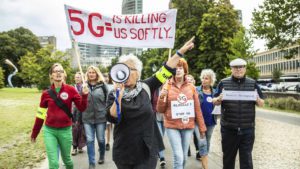Dozens of municipalities want the national government to inform citizens more about the arrival of 5G. This is evident from an inventory of the NIS among all municipalities, to which about a third responded.
The municipalities play an important role in the rollout of the new mobile network. In addition to being a point of contact for citizens and organizations, they also consult with the telecom providers about the placement of new antennas.
Lately, there has been much to do about the arrival of the network. For example, cell towers have been set on fire, possibly by people who are against the arrival of 5G. An unsuccessful attempt was also made to stop the roll-out through the courts. The organization that did this fears negative health effects. Demonstrations have also been organized for the same reason.
Nearly 90 per cent of the municipalities that responded indicated they had concerns about health risks. On the one hand, it concerns letters or emails from their own residents, but it is also often about campaigns from, for example, anti-5G movements that all municipalities write to.
“It is very strange that municipalities have to organize their own arguments to settle a national discussion,” says councillor Theo Meskers of the municipality of Hollands Kroon. He speaks on behalf of the large rural municipalities in the Netherlands and municipalities in the head of North Holland, including Alkmaar and Den Helder.
“If you want to have a discussion about the health risks surrounding 5G, you need a party with authority,” says Meskers. According to the councillor, this can only be the national government in the Netherlands.
The need for communication from the central government is evident in both large and small municipalities. For example, Rotterdam indicates that it receives “large numbers of questions”.
“We try to answer them through our own channels as well as possible. But that is not enough,” said a spokesman. According to the municipality, national coordination is necessary. “It would help if the central government provides more actionable information about the rules and the health effects of 5G.” Also from Amsterdam, there is a need for more communication by the national government.
Social discussion
Sint-Michielsgestel says that there should be a broad social discussion, given the unrest that has arisen about 5G. Buren says he is in favour of better information, given the questions that some residents and councillors have.
According to De Bilt, there is communication, but “the frequency” can be increased. The need is not equally strong everywhere. There are also municipalities that indicate that they have not yet taken a position on this, and other municipalities are satisfied with the provision of information.

The Association of Dutch Municipalities (VNG) recognizes the results of the inventory. “We see a lot of questions among our residents about health risks and the consequences of the new Telecom Act for public space.” The organization says it has urged the ministry to provide clear communication to residents.
Ministry: information has been intensified
In response, a spokesperson for the Ministry of Economic Affairs said that the need for more information from municipalities has been known since last autumn and that action has been taken.
The spokesperson pointed out that regional meetings were organized last year on the theme with municipalities. The Ministry also indicates that it has “intensified” communication since last summer, including via social media. “We answer dozens of questions every month by email, telephone and social media.” Furthermore, the ministry says that the Antenna Bureau, which keeps track of the number of antennas in the Netherlands, has answered 300 questions from municipalities, the Dutch and various organizations about 5G since last autumn.













